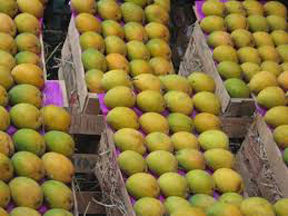 LONDON: The 28-member European Union has temporarily banned the import of Alphonso mangoes, the king of fruits, and four vegetables from India from May 1, sparking protests from the Indian community, lawmakers and traders.
LONDON: The 28-member European Union has temporarily banned the import of Alphonso mangoes, the king of fruits, and four vegetables from India from May 1, sparking protests from the Indian community, lawmakers and traders.
The recent decision by the grouping’s Standing Committee on Plant Health came after 207 consignments of fruits and vegetables from India imported into the EU in 2013 were found to be contaminated by pests such as fruit flies and other quarantine pests.
The temporary ban, proposed by the European Commission, includes mangoes, eggplant, the taro plant, bitter gourd and snake gourd, and prohibits the import to tackle the “significant shortcomings in the phytosanitary certification system of such products exported to the EU”.
Though the prohibited commodities represent less than 5 per cent of the total fresh fruits and vegetables imported into the EU from India, the potential introduction of new pests could pose a threat to EU agriculture and production, the committee noted.
UK’s Defra (the Department for Environment, Food and Rural Affairs) that is backing the ban said it was necessary due to pests which could threaten the country’s 321 million pound salad crop industry of tomato and cucumber.
The UK imports nearly 16 million mangoes from India and the market for the fruit is worth nearly 6 million pounds a year.
A revision of the ban will take place before December 31, 2015.
Businesses claimed they will lose hundreds of thousands of pounds due to the ban.
Wholesalers and retailers in Indian-dominated regions of the UK have opposed the ban, which comes into effect on May 1, saying it will hit them hard.
“This is Euro-nonsense and bureaucracy gone mad. Indian mangoes have been imported to Britain for centuries. I am furious with the lack of consultation with those who will be affected by the ban,” said Indian-origin MP Keith Vaz, who has written to the European Commission president after his constituents in the city of Leicester made a plea.
He has also written to Indian Prime Minister Manmohan Singh to ascertain if the Indian government was consulted on the matter.
“Leicester held the first UK Mango Festival last year and it was an outstanding success. I, and many millions of British people, have eaten these mangoes and they certainly don’t seem to have had an effect on us. If this ban goes ahead we will have to cancel this year’s festival,” Vaz added.
A shopkeeper in Leicester said the ban could see city retailers’ profits fall by thousands of pounds.
Rajesh Pabari said he can make 9,000 pounds from selling the mangoes during their eight-week growing season.
Another trader Dharmesh Lakhanit said the fruits are “very valuable” to Leicester’s economy, according to the BBC.
UK’s environment minister Lord de Mauley also waded into the controversy, stressing that his department is working on lifting the ban as soon as possible.
“India is a key trading partner and these temporary restrictions affect a tiny percentage of the successful business we conduct with them.
“We are working closely with our Indian and European counterparts to resolve the issue and resume trade in these select products as soon as possible,” he said.
Meanwhile, an e-petition titled ‘Reverse Mango Import Ban’ has gathered hundreds of signatures over its warning that: “The ban will severely impact importers and distributors in the UK and for some it will render their entire trade unfeasible.
“The ban has been undertaken hastily. Proven treatments have not been considered before an outright ban e.g. hot water treatment, irradiation which is approved for import into the USA and vapour heat treatments,” adds the petition created by Monica Bhandari, who runs the London-based Fruity Fresh (Western) Limited import firm.–PTI






